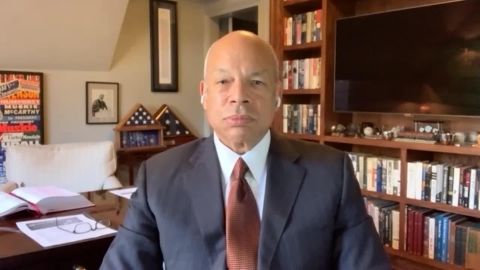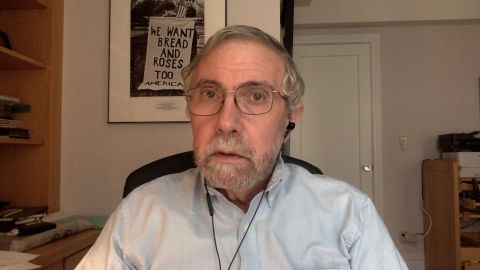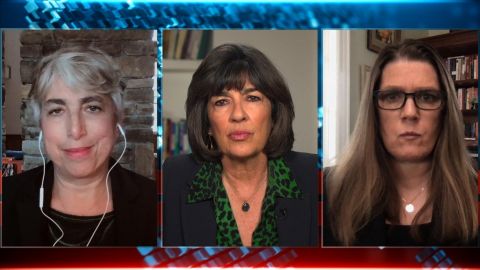Read Transcript EXPAND
CHRISTIANE AMANPOUR: Now, since that insurrection at the capitol nearly two weeks ago, people are still shocked that it could have happened both politically and operationally. Jeh Johnson is the former secretary of Homeland Security. He blames, of course, security failures, not the mention the Pentagon dithering over deploying the National Guard for several hours while pro- Trump fanatics took control inside.
(BEGIN VIDEO CLIP)
UNIDENTIFIED MALE: Defend your constitution, defend your liberty. Defend your constitution, defend your liberty.
(END VIDEO CLIP)
AMANPOUR: And as Obama’s secretary of Homeland Security, Jeh Johnson had to oversee Trump’s inauguration four years ago. Here he is talking to our Walter Isaacson about the state of national security this time around.
(BEGIN VIDEOTAPE)
WALTER ISAACSON: Thank you, Christiane. And Jeh Johnson, welcome to the show.
JEH JOHNSON, FORMER U.S. HOMELAND SECURITY SECRETARY: Thank you, Walter.
ISAACSON: Today, it is Martin Luther King Day and we’re trying to process what happened back on January 6th. To what extent do you think it was unleashing a sentiment that’s been hidden in our country and that the current president, the outgoing president help to unleash?
JOHNSON: Walter, you’re correct, today is Martin Luther King Day. I’m a graduate of Morehouse College, class of 1969. Dr. King was a graduate of Morehouse College 1948. Over my right shoulder, you will see a black and white photograph of Dr. Benjamin E. Mays, president emeritus of Morehouse College. He was a mentor to both me and Dr. King. He actually gave the eulogy at Dr. King’s funeral in 1968. Dr. King talked about the single garment of destiny and the inescapable network of mutuality that we find ourselves in. We have to face the harsh reality that in America there is a strand that is ugly, that is intolerant, that is racist, that is prone to violence if provoke, if stoked and is vulnerable to fake news, conspiracy theories, appeals to overt racism. Over the last four years, frankly, this outgoing president has peeled the lid off of that strand of our society. Told them that they are special people, that he loves them, and encouraged them to come out and display their bigotry and their intolerance in the open. We saw that in Charlottesville in 2017 and we saw it the other Wednesday on the steps and inside of the U.S. Capitol. The images are unforgettable. To me, the most horrifying image was of someone parading a confederate flag through the halls of the U.S. Capitol. We fought an entire civil war to prevent that from happening. Walter, I have ancestors from Virginia who fled slavery as one in particular as a teenager to join a colored infantry of the Union Army to prevent something like that happening. And so, this ought to shake Americans to the core to see what happened at the capitol the other day. A lot of us would like to believe it can’t happen here, we’re the most sophisticated democracy in the world, but it can happen here if the wrong forces are encouraged and emboldened.
ISAACSON: How guilty do you think that the outgoing president is of intentionally inciting that sentiment in our society?
JOHNSON: I think that is exactly what he did, intentionally exciting and inciting that segment of our society. If he didn’t know what he was doing, he certainly had a depraved indifference to what he was doing. But, you know, word is, and word is inside of the White House that he was actually excited by what was happening in the U.S. Capitol at time. Those are the exact wrong instincts to have in a president of the United States. But I believe that he is guilty of inciting a riot. I believe he is guilty of an impeachable offense and should be convicted for it, in the Senate that is.
ISAACSON: Do you think that that would further divide the nation?
JOHNSON: Well, you know, as you — you’re a historian, you probably know that Alexander Hamilton said at the time of the writing of the constitution that the impeachment processes stir the passions of the community. It is a difficult thing to have to bring the nation through. But, something like this, we just cannot let go. A sitting president inciting a mob to storm the U.S. Capitol, and to interrupt a constitutional proceeding involving the House of Representatives, and the Senate and his own vice president, that cannot be forgiven, we cannot walk away from it because we’re afraid it will be too contentious, too difficult. I’m afraid we’re going to have to face this at some point. The Senate is going to have to have a trial of what happened here.
ISAACSON: Do you think that Department of Homeland Security failed us in the walk-up to January 6th?
JOHNSON: I believe that those responsible for the security of the U.S. Capitol, those responsible for assessing the threat picture failed us, yes. And this could have been avoided. We saw what was coming. It was not classified intelligence. It was out in the open. All you had to do was to watch for it on social media and anticipate what President Trump was going to say on that day. This would not have been hard. One of the problems I suspect that we had on January 6th where we literally saw an insurrection by — this is by definition, the very definition of an insurrection. You had acting secretary of Homeland Security, you had an acting attorney general and you had an acting secretary of defense all eyeing the exits days away from leaving office, worrying whether or not they’re going to get fired and somebody, very clearly, took their eye off of the ball for this very important event.
ISAACSON: Assess for us the inside threats that may have occurred in this January 6th insurrection. And when we hear that some of the police officers inside, maybe even members of Congress were aiding and abetting this insurrection.
JOHNSON: Insider threats are always the things we worry about most in any major security event. Let’s not forget that before anyone can become a member of the National Guard or the Capitol Police or especially the Secret Service, there is a great level of vetting, screening, background scrutiny that goes into selecting those people and training those people. There probably is appropriate now, another additional level of screening before anyone is specifically selected for the event. But by and large, the people we have is gun carriers for a major security event like this are people who have already been carefully screened and vetted.
ISAACSON: As secretary of Homeland Security, you were able to monitor and watch the rise of these extremist groups and, you know, racist groups that came up, how do you think it is best that we try to handle those and prevent the rise of groups like that?
JOHNSON: Walter, it’s been an evolution. After 9/11, the Department of Homeland Security was created principally for counterterrorism. And the view then was that terrorism was extraterritorial threat. And if you consolidate into one cabinet level department regulation of all the different ways one can enter the country, land, sea and air, you have effectively dealt with terrorism. Over the last 19 1/2 years now since 9/11, we know that the principal terrorist threat is here among us, domestic base, domestic inspired extremism. The Anti-Defamation League, for example, has tracked this for years now. And so, most acts of terrorism come from within. I’m afraid that the old model, the DHS model after 9/11 is now badly outdated. So, in my time in office, we spent a lot of time here in the homeland on what we refer to as CBE, Countering Violent Extremism, meeting with groups in major metropolitan areas. And in my last year in office, I’m pleased that Congress actually gave us grant money to distribute to organizations dedicated to countering violent extremism here at home including violent white nationalism. There’s an organization, Chicago-based, at least there was four years ago, called Life After Hate that we wanted to fund. Unfortunately, those efforts kind of went off the rails over the last four years. I hope that there is a rededication to that. And then, of course, there’s always the law enforcement aspect to this, our FBI, our Homeland Security officials need to rededicate themselves to tracking and interdicting and prosecuting those who turned violent before they can actually carry out their acts of violence.
ISAACSON: You just said that your old Department of Homeland Security is not constituted, not set up right to counter the domestic extremism that we are facing. How would you change it?
JOHNSON: Well, look, if I had a magic wand — you know, time out of office gives one some perspective. If I had a magic wand and I could just reconstitute our federal government, our executive branch through decree, I’d probably create a Department of Public Safety, which exists in many other governments around the world in which we have every federal law enforcement agency, including Homeland Security investigations, the FBI, the ATF, the DEA, the Martial Service, deconflict all of their missions under one cabinet level official, put the Department of Justice off to the side, those are the lawyers. It will probably never happen, but that is the ideal way to deal with our domestic security, our law enforcement needs in my judgment. It would be a huge department. But what we have set up right now is you have many law enforcement agencies as part of the DOJ and many as part of DHS that often times don’t deconflict well. The actual largest collection of the law enforcement agencies in DHS, not DOJ, but they are still the FBI, the ATF, the DEA, Marshal Service that reside within DOJ. And occasionally, frankly, they compete with one another. And occasionally, depending upon the leadership, they don’t communicate well. In the current threat environment, I think there needs to be greater efforts at consolidation.
ISAACSON: Do you think that the incoming Secret Service details that will guard President Biden and Vice President Harris have to be changed and have to be particularly scrutinized as you move over from the details that were guarding President Trump?
JOHNSON: Well, I don’t want to get into too much, too many matters of operational security. The presidential details itself is huge. And there is a detail leader with overall responsibility for protecting the president, the vice president, certain other people in the White House. And there is a fair amount of turnover that goes into that. It’s an extraordinarily demanding job. Someone should not be in it for a very long period of time. On the other hand, you want somebody who is familiar with the protectee’s movements, their moods, the reactions to things so they can anticipate their behavior and their movements. And so, there is a certain amount of turnover that naturally goes into the Secret Service any time there are a new round of protectees.
ISAACSON: Your great-grandfather was born in slave in Virginia. And his son became a famous sociologist, his great-grandson became a cabinet secretary. Tell me how your family history informs the way that you think about this current moment.
JOHNSON: My grandfather was a sociologist, and he had a Ph.D. He wrote a lot about civil rights in the 1940s and 1950s. He was suspected of being a member of the communist party. My own grandfather testified before the House on American Activities Committee in 1949 in the same room I am told in a house office building where I testified and oversight hearings for the Department of Homeland Security. But he was an optimist. He believed in this country. He believed in the code of the nation. He died in 1956 an optimist even before we had civil rights laws. So, I don’t believe he would be surprised that his own grandson would ultimately become responsible for the Homeland Security of the nation. I do think he would be very disappointed, as am I, that 12 years after we elected a black president, which for many of us was a huge step forward toward a more perfect union, we still live with a very large strand of American society that is racist, intolerant, prone to violence, grievance, disenfranchised. And once in a while, the lid gets peeled off, and that kind of hatred comes out in the open. We still live with this. We lived with it in the ’40s and ’50s, we lived with it in the ’60s and it’s still here well into the 21st century. And I’m afraid that we may have — we may continue to live with it for my lifetime and yours. And it is really up to the mainstream of America to turn their back on this kind of hatred and condemn it and deplore it.
ISAACSON: This past weekend, you were the guest host of a radio station show, and you got to do a playlist in which you picked some songs of protest, peace and prayer.
JOHNSON: And prayer. Right.
ISAACSON: And one of them, the final one, which really moved me, it’s one of my favorite songs, is sung by somebody from here in New Orleans, it was Mahalia Jackson’s “How I Got Over.” And she sang that during Martin Luther King’s march on Washington in 1963. Tell me why you pick that.
JOHNSON: Well, you have really done your homework for this interview, Walter. Thank you. That is my other life. I am a huge classic R&B fan, and there’s a small little public radio station here in the Northern New Jersey area, WBGO, 88.3, and yes, I am giving a plug for it. And every once in a while, I go on the station and I literally select my own music, spin my own records. And so, I thought that it was appropriate to play songs that reflect prayer, peace and protest. And Mahalia was the voice of the civil rights movement in the 1960s. And you are right, “How I Got Over” was one of the songs she sang at the march on Washington. There are many accounts that she stole the show that day. And I thought it was a suitable tribute to Martin Luther King, this is MLK weekend, and I thought it was a gesture at trying to heal our nation right now, at least for the listeners of that small little station, which can be heard all over the tristate New York area by the way.
ISAACSON: Tell me what she said to Dr. King when he was reading his prepared speech.
JOHNSON: Well, you know, that is interesting. As the story goes, he was reading from a prepared text when he was giving his speech at the march on Washington, and it is apparent, when you watch the speech, he is reading from a prepared text. And as the story goes, Mahalia who was sitting within earshot of him said, tell them about the dream, Martin. And he had given a version of “I Have a Dream” at a march in Detroit some months before. And so, he kind of leaned back, looked up and began to talk about how he had a dream. And, you know, the rest is history, as you know. But as the story goes, that whole part of the speech was inspired by Mahalia Jackson and prompted by Mahalia Jackson.
ISAACSON: Your angels kept watching over me.
JOHNSON: Right.
ISAACSON: Secretary Jeh Johnson, thank you so much for joining us.
JOHNSON: Thanks for having me on. This is a great discussion.
About This Episode EXPAND
Paul Krugman; Andrea Bernstein; Mary Trump; Jeh Johnson
LEARN MORE


